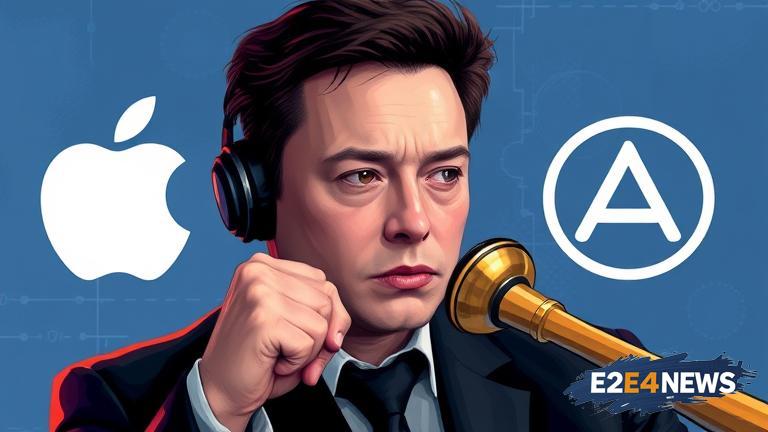In a shocking move, XAI, a company founded by billionaire entrepreneur Elon Musk, has filed a lawsuit against tech giants Apple and OpenAI, alleging that they have engaged in anti-competitive practices to dominate the chatbot market. The lawsuit, which was filed in a US court, claims that Apple and OpenAI have used their significant resources and influence to stifle innovation and prevent smaller companies from competing in the market. XAI argues that this has resulted in a monopoly, with Apple and OpenAI controlling a significant portion of the chatbot market. The company claims that this has harmed consumers, who are being denied access to alternative chatbot services that could offer better features and prices. XAI also alleges that Apple and OpenAI have used their dominance to suppress competition, by acquiring or investing in smaller companies that could potentially challenge their position. The lawsuit is seen as a significant development in the tech industry, as it highlights the growing concerns about the dominance of a few large companies and the impact this has on innovation and competition. Musk has been a vocal critic of the tech industry’s largest companies, and has previously spoken out about the need for greater regulation and competition. The lawsuit is likely to be closely watched by regulators and industry observers, as it has the potential to shape the future of the chatbot market and the tech industry as a whole. XAI is seeking damages and an injunction to prevent Apple and OpenAI from continuing their alleged anti-competitive practices. The company is also calling for greater regulation of the tech industry, to prevent similar monopolies from forming in the future. The lawsuit is the latest in a series of challenges to the dominance of the tech industry’s largest companies, and is seen as a significant test of the industry’s commitment to competition and innovation. Apple and OpenAI have yet to respond to the lawsuit, but are likely to vigorously defend themselves against the allegations. The outcome of the lawsuit is uncertain, but it is clear that it will have significant implications for the tech industry and the future of the chatbot market. The chatbot market is a rapidly growing sector, with companies using chatbots to provide customer service, answer questions, and offer personalized recommendations. However, the market is currently dominated by a few large companies, including Apple and OpenAI, which has raised concerns about the lack of competition and innovation. XAI’s lawsuit is seen as a challenge to this dominance, and a call for greater competition and innovation in the market. The company is arguing that the current market structure is stifling innovation, and preventing smaller companies from competing. The lawsuit is also seen as a test of the tech industry’s commitment to competition and innovation, and the willingness of regulators to take action against anti-competitive practices. The outcome of the lawsuit will be closely watched by industry observers, and is likely to have significant implications for the future of the chatbot market and the tech industry as a whole. The lawsuit is a significant development in the ongoing debate about the dominance of the tech industry’s largest companies, and the need for greater regulation and competition. It is also a reminder of the importance of competition and innovation in driving progress and improving consumer outcomes. As the tech industry continues to evolve and grow, it is likely that we will see more challenges to the dominance of the largest companies, and a greater focus on promoting competition and innovation. The lawsuit is a significant step in this direction, and is seen as a call to action for regulators and industry leaders to take a closer look at the market structure and the impact of anti-competitive practices on consumers and smaller companies. The future of the chatbot market and the tech industry as a whole will depend on the outcome of this lawsuit, and the willingness of regulators to take action against anti-competitive practices. The lawsuit is a reminder that the tech industry is not immune to the laws of competition, and that companies must compete fairly and innovate to succeed. The dominance of a few large companies is not inevitable, and can be challenged through regulation and competition. The lawsuit is a significant development in the tech industry, and is likely to have far-reaching implications for the future of the chatbot market and the industry as a whole.
